President Trump has offered mixed signals about precisely what his attitude toward the Israeli-Palestinian conflict will be, but Palestinians see little prospects for meaningful improvement, reports Dennis J Bernstein.
By Dennis J Bernstein
Israeli Prime Minister Benjamin Netanyahu’s recent visit to Washington reaffirmed one thing in terms of U.S./Israeli relations: that not much will change in the United States’ massive one-sided support for Israel, says Palestinian author and activist Ramzy Baroud.
The U.S. will continue to support, arm and publicly defend the ongoing Israeli policy of ethnic cleansing, as things go from bad to worse, Baroud adds, noting that Israel — with U.S. support — has already reduced the Gaza Strip to a fenced-in prison, where well over a million Palestinians don’t even have access to the basics such as food and clean water. Now, the Israeli government has turned its full attention to the West Bank, which is under siege with new Israeli settlements.
I spoke to Ramzy Baroud about the Netanyahu visit, the illegal settlement boom on the West Bank with its concurrent upsurge in settler violence, the implications of moving the U.S. Embassy to Jerusalem, and the general daily brutalities of living under the iron fist of Israeli occupation.
Baroud is an internationally-syndicated columnist, a media consultant, and the founder of PalestineChronicle.com. His latest book is My Father Was a Freedom Fighter: Gaza’s Untold Story.
Dennis Bernstein: It is good to speak with you on the heels of the visit to the U.S. by Israeli Prime Minister Benjamin Netanyahu. […]
This is sort of how the visit, and, I guess, the story of Palestine and Israel, is being framed by the corporate press. This is coming off the BBC, but it’s typical: U.S. President Donald Trump has asked Israeli Prime Minister Benjamin Netanyahu to “hold off on settlements” in a joint press conference.
Mr. Trump also promised to deliver “a great peace deal” but said Israel and the Palestinians must both compromise. So that’s the BBC’s characterization. How would you frame the current visit?
Ramzy Baroud: Well, the current visit, really, is a culmination of a whole bunch of events that have been taking place for months now prior to Trump coming to office, and the inauguration, and the aftermath. There’s a great sense of euphoria, a great deal of euphoria, among the Israeli political elites. The whole two state solution enterprise is dead. The whole era of being told what to do, or being pressured in any way, or being censured, even in the slightest, most gentle way by previous administrations, that era is over, done with.
And now we are entering into a new era in which Israel single-handedly dictates everything it needs to dictate. Not just on Palestinians but on the United States, thus the so-called international community. So I see this kind of as a celebration of the Israeli political triumph, over the American foreign policy, and the balancing act that they have been playing in the Middle East for, really, in the last 25 years since the Madrid peace talks in ’91, until today. It’s the end of all of that, and it’s ushered in our new era, and that’s an Israeli era, for sure.
DB: Well, just to set the tone. You say that …Trump’s pick for the U.S. Ambassador to Israel [David Friedman], is to the right of Netanyahu. You want to say a little bit about that choice, and his desire to move the Embassy to Jerusalem?
RB: Well, that’s right. There was a recent article by a Professor Rashid Khalidi in the New Yorker, in which he said this is the first time in the history of U.S./Israeli relations that you could actually swap both ambassadors, the Israeli and American ambassadors, back and forth and you can’t even tell which one is there to defend Israel’s interests, and which one is there for American interests. There is this cohesion that is happening at last. And it’s a perfect scenario for Israel.
The new pick for the ambassador [Friedman] is someone who is very much pro-settlements, does not even refer to the West Bank by its internationally recognized name. He refers to the occupied territories as Judea and Samaria. It’s the land with the biblical reference, made by right-wing ultra-nationalists and religious Jewish politicians. So we are seeing something that’s really unprecedented. The attempt at kind of dilly-dallying around this issue is over as far as American foreign policy is concerned.
American foreign policy, now, is exactly what Israel says it is. And I think it was really interesting what Trump said today in the press conference, when he said “I don’t care, two states, one state, it’s what you guys decide.”
But the interesting part about it, is that when you have an occupier and an occupied, someone with powerful military and someone who’s, you know, just in a constant state of self-defense, and someone that is commanding one of the Middle East’s, the strongest economy, and others who are living in a South African apartheid-like Bantustan, well guess what? You can’t really decide equally. One would have to impose his vision on the other.
And that is precisely what Trump is doing. He is giving Israel free hand to behave in any way that is consistent with its interests. And as you heard, what Netanyahu was saying was pretty dark and terrifying actually.
DB: Now, clearly Israel has always been given the gold from the United States. There’s always been that kind of relationship. I guess Obama signed off on that deal for $38 billion … in aid–the most [to a foreign nation] ever. That certainly was a demonstration of U.S. friendship, if you will. But, how do you see this proceeding? If they go into Jerusalem, if they put the Embassy in Jerusalem, what happens next? How does that reverberate within the Palestinian community? Is it possible that they could just stand by?
RB: Of course not. They will not stand by. And that’s what Trump does not understand. I think there’s a couple of important points that will have to be stated. The first one is that the U.S. did not put any expectations on Israel, whatsoever.
The $38 billion and whatever political support and financial backing that they have received through all these years, they haven’t put any expectations, except one single expectation. And that is to allow the U.S. the prestige, the leadership, the ability to come and impose itself as the “honesty spokesman,” if you will.
Because the peace process was essential for American foreign policy. It is more important than we can possibly imagine. It is that kind of soaked power opportunity to impose themselves, not just on the Palestinians in the occupied territories, but on the rest of the Arabs. If you play along you’re a moderate, if you are against us, you are a radical. That’s all the United States expected from Israel. Just use the language of peace, just entertain this discourse and we will give you exactly what you want.
Even that proved to be too much for Israel. They don’t want that, and Trump is willing to completely move away from that entire discourse. I think this is really interesting, and I think, eventually, it’s going to alter America’s standing in the Middle East altogether. What Trump doesn’t understand, he is… it’s all about making the deal… it’s all about business, it’s all about looking at who is the powerful party? Who is the weaker party? And he is just thinking of it in terms of dollars and cents. Now, it doesn’t work that way in the Middle East.
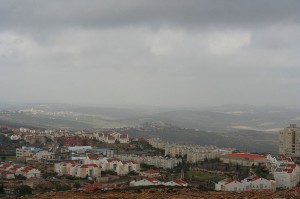
A panoramic view of the Israeli settlement of Ariel on the Occupied West Bank. (Photo credit: Beivushtang)
Even the supposedly powerless and unarmed Palestinians could actually prove to be… their reaction could prove to be truly consequential, as far as American foreign policy is concerned. Palestinians are most likely to react, to mobilize. There are a great deal of efforts at forging a new Palestinian political outlook. They are looking for alternative leadership. They have their alternative allies.They had a meeting in Moscow, between Hamas and Fatah recently.
But also, you could see that entire region as far as destabilizing against the Americans, who are trying to, kind of, maintain their status and their influence in Syria, and Libya, over the Gulf, and so forth. And they find themselves in this huge anti-American backlash, as a result of their blatant support for Israel. Then Trump is going to actually realize, “Okay, this is not as straightforward as I thought it would be.” What works in business might not actually work in politics, after all.
DB: What are the realities, at this time, in terms of settlement buildings? How much has been built? How does that look at this point?
RB: Actually, it was interesting what Trump said to Netanyahu when he kind of leaned, you know, sideways and he said very gently, “If you could just hold off on the settlements, just a little bit.” The problem is they have already issued approval of 6,000 settlement units throughout Jerusalem and the West Bank. And this number of units goes beyond any assumption of natural growth of settlements. It’s way beyond that. It means that they are really now looking into expanding settlements beyond the fast streak it has experienced in the last eight years.
Not just that: they are now talking about legalizing all the illegal settlement outposts, which range from anywhere from 100 to 200 outposts, even more. If you are going to legalize these illegal outposts, it also means… and, of course, by saying legalize, I mean from an Israeli government, from an Israeli officials point of view, as you know, all Israeli settlements are illegal under international law…. But if they are to do so, it means that they would have to provide protection. The army would have to be deployed. There would have to be expansion. There would have to be fortification of these settlements.
So we are really talking about an unprecedented land grab here, on the West Bank. It doesn’t matter what happens to the Palestinians in the process. Let’s take as much as we can, and let’s do that fast because this is the perfect opportunity to do so.
The last point I want to make is, for the first time in 20 years there was a brand new settlement, that has been approved. This is also new, in the sense that Israel has been justifying the expansion of the growth of settlements based on what they call natural expansion. But if they are issuing orders for new settlements, it means they are going back to the 1967 mentality of “This is part of the land of Israel. This is part of Yehudi and Santa Maria. It’s our biblical land, and therefore Palestinians have no rights in this land anymore.” So, not only the language itself is changing, but there are actually parts on the ground that prove that the action itself is also fundamentally being altered.
DB: Can I ask you to say a little bit about the relationship between the settlements and the military? How the military, if they do use the settlements… because we hear a lot about torture. You reported in your service, in the palestinechronicle.com, you are reporting about the torture of Palestinian teens. How does the settler movement play into this, sort of, growing use of torture, which, obviously, Trump thinks works.
RB: That’s right. Well, I think it’s important that we delineate this. There are no separate enterprises, the army enterprise and the settlement enterprise. Sometimes the media makes the mistakes of trying to make it look like the settlements are, kind of, behaving at odds with Israeli official policy. They actually don’t. And we actually have been saying this from the very, very beginning, that this is a charade in Israel’s name. And, the fact that they have just approved and legalized right after… all the settlements that have been built supposedly illegally… the fact that they have done so, it’s an indication that this has all been part of the Israeli official program, all along. So, this is really important that we remember.
And also, we need to remember that in 1967, when Israel occupied the West Bank, Gaza and East Jerusalem, there were two settlement movements happening. One that was commissioned by the government, as for some strategic reason. And the other one was the religious settlements, that were built for spiritual reasons. At the end of the day, as far as Palestinians are concerned, it makes no difference whatsoever. This is land grab, our land, private property, lands being confiscated, whether for spiritual reasons or whether for strategic political reasons, it makes no difference. So as far as Palestinians are concerned, they are all working together, it’s all one and the same.
The issue of torture, this is related to Gaza, Dennis. In order for anyone from Gaza to leave to Israel, to be treated in Israeli hospitals, or West Bank hospitals, or Jerusalem hospitals, they have to go through the Israeli border area, which is the Arab checkpoint. The Arab checkpoint means they have to meet the intelligence, the Shin Bet, the Israeli internal intelligence, which is equivalent to the FBI. And quite often they are bargain. If you want to get through, you have to divulge information, you have to give us names. Many people refuse to do so, many people get tortured in the process, and many people actually go home, and die as a result.
DB: I think one of the things that isn’t at all reported through the corporate press, in any way, shape or form, rarely even a mention… doesn’t get into the New York Times, or anywhere. But the way in which… it sort of, you know, you’ve got the wall, right? That is so tall, you can see it from space, as sort of the anvil. And then you’ve got the expanding settler movement, as the hammer.
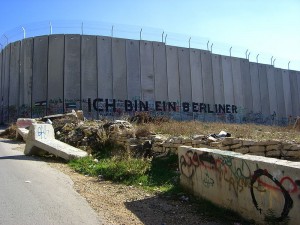
A section of the barrier — erected by Israeli officials to prevent the passage of Palestinians — with graffiti using President John F. Kennedy’s famous quote when facing the Berlin Wall, “Ich bin ein Berliner.” (Photo credit: Marc Venezia)
And I say that in the context of thinking about the violence imposed by the settlers, on the peoples whose land they are stealing. That story, which is a continual drumbeat of violence beyond the torture of children, which we… there’s a peek through every once in awhile, in a human rights report. Could you talk about that?
RB: That’s right. And it is sad that we never hear about it. I just feel like, I’ve been doing this for a long time, Dennis. And I know you have been doing it for a long time, as well. And we are yet to register any fundamental shift in how mainstream media really perceives the situation in Palestine/Israel. To the contrary, I think it’s becoming even more consolidated behind Israel, which is entirely immoral and inexcusable, especially at a time when that country is now really ruled by ultra-nationalists and some, even, fascists like Avigdor Lieberman and others.
And by any political standards these men are fascists. And yet they rarely get any serious criticism in American media. While the settlement movement, I think this is really interesting, Dennis, is the fact that we are… we have seen how the settlers change their political position within Israeli politics from being on the margins, many years ago, in the post-1967, to becoming the center, most important component in the formulation of Israeli…
DB: … the soul. The soul of the future of Israel.
RB: Absolutely. No question about it. And they have a great deal of influence in the army. They can actually sway Israeli politics, altogether. In some strange way, the life of Netanyahu, as right-wing as he is, he’s actually on the left side of those who are truly capable of destroying his coalition at any given moment. They don’t care about politics anymore. They are not the savvy Zionists of the past. They are right and they take exactly what we want.
That’s why the settlers are being empowered, at this point. They are empowered in the sense that they are getting exactly what they want … and the Palestinians are paying the price for it.
So, Palestinians are falling victim, not just for Israeli army violence but for settler violence as well. The land that the settlers are usurping from Palestinians, well it has owners and sometimes these owners try to defend their land, and they pay the price for it. And, I don’t know if your audience is aware of … the whole process of how a settlement is even constructed in the first place. But it is a very, very simple process.
The settlers come and they push the people out of the area. And then they claim it as their own, the army is involved. They make it a military zone, they fence it, starts growing, we see caravans moving in, trailers moving in, fences going higher and higher. And eventually it becomes a settlement. Well, Palestinians usually fight back for their land, their olive groves, the schools, for the roads, for the villages. And they pay a very heavy price.
DB: Yes, they do. That’s sort of the front line of the suffering. We mentioned the word Gaza. Your most recent book My Father was a Freedom Fighter: Gaza’s Untold Story, and again when you… it must be absolutely maddening, I know it is, to see what’s happening on the ground in Gaza, and hear the way in which, the character of this story, that these are a bunch of fenced-in terrorists, that we have to go to war against to defend Israel’s right to exist. That is the theme, that still reverberates in the press.
And with Trump coming in… and I can imagine him using Israel as a model, “See I told you torture works, and the Israelis prove it time and again. It works, that’s where they use it. That’s why they’re so effective blah, blah.” Have you been thinking about that?
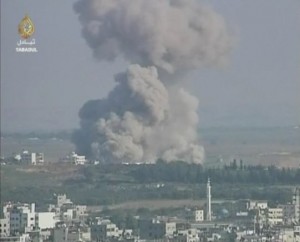
An Israeli strike caused a huge explosion in a residential area in Gaza during the Israeli assault on Gaza in 2008-2009. (Photo credit: Al Jazeera)
RB: It is sad to see that the United States at this point in its history, where they really need to have as much sensible policies at home and abroad as possible to stave off various crisis, they actually look at Israel for inspiration. And this is what Trump said today. “Israel is absolutely the most inspiring model.” I mean, this is a crisis. It’s a moral crisis, but it’s political as well.
A place like Gaza has been under siege since 2006. Of course, it has been under occupation since 1967, but under a hermetic siege, for ten years. People are malnourished, people are suffering, they are digging tunnels under various fences in order for them to get food and supplies. Egypt is part of the siege, not just Israel. And not just the siege alone. But there are these intermittent wars that have been taking place in 2008-2009, 2012, 2014.
Thousands of Palestinians perished, tens of thousands have been wounded. Nearly a quarter of the Gaza Strip has been destroyed. And yet we didn’t hear anything of that, yesterday. There’s no humanitarian process throughout. If this happened in any other part of the world it would really be the headline in every newspaper. But, in Gaza, somehow, this is so irrelevant, so unimportant.
And the one that really need protection is the one whose imposing destruction on other people. It’s Israel that needs our protection. It’s Israel’s security that really matters. Not the security of those desperate, poor souls that have been suffering year after year after year, crying for help, and getting very little, of it. And this is why we really need to keep the focus on this issue, Dennis. Gaza is a central piece to this discussion, and the suffering of the people there is getting worse with time.
DB: People have trouble getting clean, clear water, fresh water. Kids are sick because of that.
RB: The United Nations has decided… rendered Gaza, it’s not suitable for human habitation in 2020. Others have actually said it is already not suitable … because of the issue of the polluted water, and the depleted uranium, as a result of the war, the fact that 100,000 people are still homeless, the fact that half of the population is unemployed, and so forth. With no political horizon, and no respite, whatsoever.
Dennis J Bernstein is a host of “Flashpoints” on the Pacifica radio network and the author of Special Ed: Voices from a Hidden Classroom. You can access the audio archives at www.flashpoints.net.

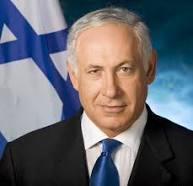
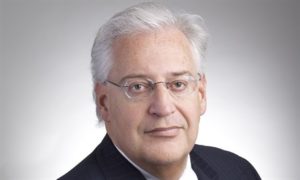
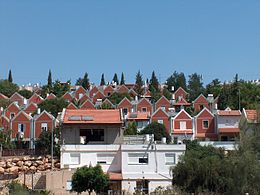
The murderous and thieving little cesspool of a nation-state is really feeling its oats these days.
I wonder if international Jews understand the peril the swine in Israel is putting them into. They demand (and deserve!) legal protections from nasty and harmful behaviors against themselves, but are all-too-often either perfectly quiet about or openly supportive of the horrible abuses heaped on Palestinian humans in the “holy land”. Do they truly not care about the Palestinians as much as they do their precious selves? People are starting to notice….
I wonder if international Jews understand the peril the swine in Israel is putting them into.
Mondoweiss.net is a source for people of Jewish heritage who have retained the attributes of civilized people and who speak out against the inhumanity of Israel’s right-wing politicians and the racist segment of its people. Among the minority of Israelis who oppose their government with great courage are Uri Avnery, Gideon Levy, Neve Gordon, and Amira Haas.
Unfortunately, from an overall point of view the American people are not in any position to be self-righteous when it comes to policies. After all, the Israel lobby doesn’t put a gun to our politicians’ heads to get their support for Israel. The lobby takes advantage of their moral bankruptcy and bribes the Judas-Democrats and Judas-Republicans with their thirty pieces of silver.
Swine is not a nice way to talk about the Israelis
What a squalid story the history of U.S.-Israel relations makes. With Congress a perpetual assembly of Israel lobby courtesans, the White House the residence of prime accomplices, and the American people wallowing in ignorance, what more could we expect?
Forget the American empire. It is more like Israel’s mercenary force.